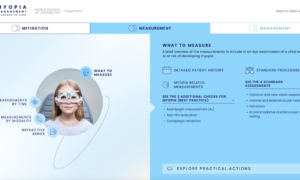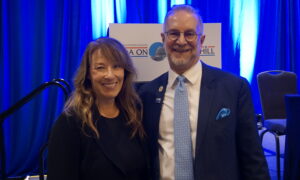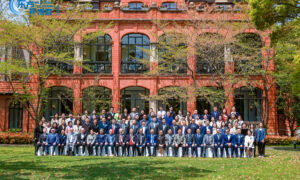March 1, 2024
By Grant Miller, OD
We cannot continue to let the visual system be one of the areas of our bodies that we say is okay to deteriorate over time. That is why our myopia management champion is our culture, our communication, and our shared journey.
If I told you to think of a champion, you would likely think of your favorite athlete winning it all. What about someone who fights for a cause on behalf of someone else? Is that person a champion?
Whether in sports, academics, or activism, a champion is characterized by their dedication, resilience, and ability to inspire and lead others toward positive change. That is why our myopia management champion is not just one individual — it is a collection of our culture, communication, and shared journey.
Our Culture as Myopia Management Champion
Culture is easy to understand when we look at a group of individuals. It is that group’s knowledge, beliefs, values, and communication — all at the core of our office’s culture of childhood myopia.
- We use our knowledge to raise awareness of the problem so a parent can learn and adapt in an environment focused on understanding that childhood myopia is abnormal.
- We believe that doing nothing is the greatest risk for a child when it comes to myopia progression.
- We value the fact that every diopter of myopia matters to the long-term health and function of the visual system.
- We effectively communicate all of the solutions to slowing the progression of childhood myopia.
Instead of wall-to-wall frame boards and branded point-of-purchase signs, our walls are covered with posters discussing the problem of childhood myopia. The waiting room TV, which serves as our shrine for all things myopia management, loops videos on the concerns about childhood myopia and highlights testimonials from the children and parents enrolled in our program. You feel and experience our myopia culture from the moment you enter our doors, setting the tone that we are going to be a unique experience from any other office you will visit.
Our Communication as Myopia Management Champion
Communicating the problem of childhood myopia will continue to be one of the most significant endeavors that clinicians will face. Too many times, we open our mouths and spend fifteen minutes talking about disease pathology, percentages, and blindness, only to leave parents confused about what they just experienced. Instead of educating parents about myopia pathology ad nauseam, how do we communicate a solution to childhood myopia progression? How do we lessen the burden on the doctor to pitch myopia management at the end of the exam? We do that by communicating the problem with childhood myopia on the phone when scheduling the exam, at check-in, during pre-testing, during the examination, at check-out, and during the follow-up.
- Scheduling an Exam: Train your staff to guide phone, email, and text conversations toward the subject of myopia management. Rather than simply offering to schedule a routine exam, present the option of scheduling a childhood myopia screening. Not every parent will engage, but those who are curious will ask what it is. That allows your staff to explain that your doctor is concerned about the impact of screen time on children, and it will determine if the child is at risk for eye problems. The screening is a part of our regular exam, but how we present it is how we start communicating the problem.
- Check-In: Give the parent a form on childhood myopia to review before they are taken back to the exam room. “Dr. Miller is concerned about the impact screen time has on children’s eyes, and he would like you to read over this form before the exam.” A parent might ignore this form once they sit down, but it serves as another point of emphasis for the problem of childhood myopia.
- Pre-Test: Staff can reinforce their concern during pre-testing with autorefraction and biometry. “Dr. Miller will be in shortly to discuss his concerns with Johnny’s eyes, so please ensure you have read over the information on that form.”
- The Exam: Take the emphasis off us educating patients and parents about the pathology of myopia. Instead, put the focus on letting the parent know that you are concerned about their child’s eyes. Make a connection that builds trust and reaffirms to the parent that increased screen time negatively impacts their child. It is a fine line, but we must keep it simple to prevent confusion.
- Check-Out: Lastly, we need to talk about the myopia problem after the parent leaves the office. Most parents come to the office thinking their child only needs glasses, so they are not prepared to receive a bombshell about how their child will likely lose vision later in life if they only get another pair of glasses. The parent needs to be spoon-fed this information over days or weeks, which can be accomplished by sending emails or texts from your office messaging system. You can also integrate with an automated education platform such as Hoot Myopia Care.
Our Shared Journey as Myopia Management Champion
Lastly, we celebrate the individuals sharing our goal to slow the progression of childhood myopia. Make the child the champion of your practice because they are a part of the solution that promotes change — change to do more than just prescribe a pair of single-vision glasses and/or contact lenses. Be loud and be proud because everyone involved is helping to change the conversation on childhood myopia.
We do not want this to be only a transactional experience. We want the doctor, staff, parents, and child to have fun throughout their entire journey. Most parents will not fully understand what we are doing for their child’s long-term visual health, but if they see that we are celebrating their child and their child is enjoying it, then they will absolutely want to continue the journey. As that parent and child have fun and see the value, they become a word-of-mouth referral source. We even take it a step further by hosting events focused on myopia management. During these events, our “champions” are celebrated with VIP badges and goodie bags to support their involvement in our program while also serving as a source of inspiration to other parents.
We cannot continue to let the visual system be one of the areas of our bodies that we say is okay to deteriorate over time. That is why our myopia management champion is our culture, our communication, and our shared journey.
 |
Dr. Grant Miller owns and practices at Grand Eye Care in River Grove, Illinois. After launching a dedicated myopia management center in the office, he appeared on WGN Daytime Chicago’s national television broadcast to educate viewers and parents on orthokeratology and the rising myopia concerns. Dr. Miller is committed to changing the conversation about childhood myopia through a one-of-a-kind myopia management experience.
|














